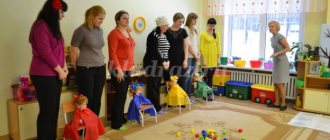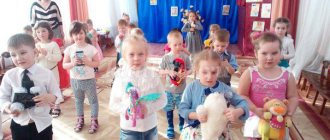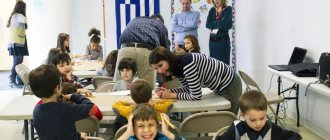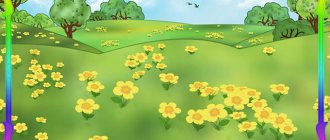Interaction with parents in the group from 2 to 3 years old “Baby”
Author:
Nepelyak Maria Ivanovna,
teacher
BU DOU DSOV No. 4 “Spring”
Raduzhny city
Relevance of the work
The interaction between kindergarten and family is one of the priority areas of work in light of the introduction of the federal state educational standard of preschool education into the educational process of preschool educational institutions, using the integration of educational areas, which runs like a red thread through work with parents (legal representatives). The changes taking place today in the field of preschool education are aimed, first of all, at improving its quality. Achieving a high quality of education for pupils, fully satisfying the needs of parents and the interests of children, and creating a unified educational space for the child is possible only if there is a system of interaction between the preschool educational institution and the family.
It is important to consider the problem of interaction between kindergarten and family as a two-way process: on the one hand, this is “kindergarten - family” - the process is aimed at optimizing the influence of the family on the child through improving the pedagogical culture of parents and providing them with assistance; on the other hand, this is “family - kindergarten” - the process is characterized by the inclusion of parents in the educational process of the kindergarten, which is not new . The initiators of establishing cooperation are teachers, since they are professionally prepared for educational work.
Main priorities and areas of work:
1. Unity in the work of the kindergarten and family in the upbringing and education of children.
2. Mutual trust in the relationship between teachers and parents, understanding of the needs and interests of the child.
3. Establishing correct relationships based on friendly criticism and self-criticism.
4. Involving parents and the public in the activities of preschool educational institutions and in working with families.
5. Creating favorable conditions for increasing the pedagogical and psychological literacy of parents in the upbringing and education of preschool children.
Goals:
formation of partnerships between children, parents and teachers of the group;
improving parent-child relationships.
Tasks:
involving parents in cooperation in matters of education and development of children;
providing information and educational support to parents in the development and upbringing of children;
creating conditions for the development of the child’s abilities in various activities;
individual work with families of pupils.
The content, organization and methodology of cooperation between preschool educational institutions and parents include:
- unity in the work of preschool educational institutions and families in raising children;
- mutual trust in the relationship between teachers and parents, understanding of the needs and interests of the child and their responsibilities as educators;
- strengthening the authority of the teacher in the family of pupils and parents in kindergarten;
- establishing correct relationships based on benevolent criticism and self-criticism;
- Using various forms of work between the kindergarten and the family in their interrelation: familiarization with parents and other family members; consultations; group and general parent meetings, etc.;
- systematic planned communication with parents throughout the year, taking into account the tasks and content of educational work with children.
Forms and methods of working with parents:
Interaction with parents on arranging an area for walking in the winter
- Training parents in joint activities with children on sensory development (lesson with Dienesha blocks)
- Training parents in joint activities with children (didactic games)
- Dads’ participation in preparations for the March 8 holiday, making a greeting card (productive activity)
- Training parents in joint activities with children (theatrical activities)
Informing parents
Currently, teachers use various forms of interaction with parents, both traditional and non-traditional.
Traditional forms have entered the life of kindergarten since the formation of public preschool education. They can be divided into collective, individual, visual.
Collective forms include parent meetings. This is an expedient and effective form of work for educators with a team of parents, organized familiarization with the tasks, content and methods of raising children of a certain age in a kindergarten and family.
The next collective form of interaction with parents is a conference . Its task is to promote the best practices in family education. During the conference, a set of methods is used - visual materials, presentations by specialists, and exchange of experiences between parents. This form involves summing up the results, a kind of report, so conferences are held at the end of the academic year.
Individual forms of interaction with parents include conversations and consultations. Conversations are the most accessible and common form of establishing communication between a teacher and a family. The goals of the pedagogical conversation are to exchange opinions on a particular issue and achieve a common point of view, providing parents with timely assistance.
Consultations are organized in order to answer all the parents’ questions and allow them to discuss a specific issue. It encourages parents to take a closer look at their children, identify their character traits, think about their upbringing methods, and analyze their own experience of communicating with the child. The topics of consultations are varied. It is determined by the tasks of raising a child.
During the consultation, parents concretize their knowledge, and they have a need for self-education.
Visual forms play an important role in interaction with the family.
Sometimes parents themselves note that they have knowledge, but they do not know how to apply it when raising a child. Therefore, the term “pedagogical education” is somewhat outdated. Now we are talking about the ability of parents to use the acquired knowledge, obtain it independently, and analyze their own educational activities. Various forms of interaction between preschool educational institutions and families are aimed at this.
Portable folders are so called because they are given to families for temporary use. They contain specific material about the upbringing and education of children. For example: “What to do if a child does not want to put away toys.”
Screens contain small text, supplemented by additional drawings, illustrations, and photos. They are located on children's lockers in the locker room or on the table in the parent's corner.
It is recommended to set up stands for parents: “What we did; “I know how, I can, I love” - information about the child’s skills, achievements, interests, etc.
Photo montages: “That’s how big we are”, “About me” - information sheets with detailed information about each child.
If parents are not interested in the material provided, the reason for this may be boring text, small print, uninteresting topics.
Non-traditional forms of interaction with parents are aimed at attracting parents to preschool educational institutions and establishing informal contacts. These include informational - analytical, leisure, educational, visual - information forms.
Information and analytical forms are aimed at identifying the interests and requests of parents, establishing emotional contact between teachers, parents and children. This includes surveys, tests, questionnaires, and a “mailbox” where parents post questions that concern them.
Leisure forms - joint leisure activities, holidays, exhibitions - are designed to establish warm, informal, trusting relationships, emotional contact between teachers and parents, between parents and children. Leisure activities in working with parents turned out to be the most attractive, in demand, useful, but also the most difficult to organize . This is explained by the fact that any joint event allows parents to: see their child’s problems and difficulties in relationships from the inside. Scenarios for holidays and entertainment are developed together with parents, music director, and senior teacher. Participation in clubs or studios.
The work being carried out allows us to increase the psychological and pedagogical competence of parents in matters of parent-child relationships. The main goal of such events is to strengthen parent-child relationships.
Cognitive forms play a dominant role in improving the psychological and pedagogical culture of parents. Their essence is to familiarize parents with the age and psychological characteristics of preschool children. Formation of practical skills in raising children. The main role belongs to meetings of non-traditional form, group consultations, which can be carried out creatively, based on popular TV shows: “Pedagogical Field of Miracles”, “Round Table”, “Pedagogical Living Rooms”, etc.
An open day is held with the aim of introducing parents to the life of a preschool educational institution. Parents monitor their children's activities. Educators. They get to know the kindergarten from the inside, become familiar with the organization of the subject-spatial developmental environment, and the types of children's activities.
Visual information forms in a non-traditional sound make it possible to correctly evaluate the activities of teachers and reconsider the methods and techniques of family education. For example, open events for parents, watching videos, photographs, exhibitions of children's works.
Modern parents are quite educated . They have access to pedagogical information that comes at them from various sources, but it does not imply the presence of “feedback.”
The term “interaction” implies the exchange of thoughts, feelings, and experiences in the process of communication. It is inappropriate to rely on a monologue when working with parents. Dialogue, establishing “feedback”, and the personal interest of parents are important. However, knowledge cannot be imposed.
In conclusion, it should be noted that the advantages of modern forms of interaction between preschool educational institutions and families of pupils are undeniable and numerous:
– a positive emotional attitude of teachers and parents to work together to raise children. Parents are confident that the preschool educational institution will always help them in solving pedagogical problems and at the same time will not harm them, since the family’s opinion and suggestions for interaction with the child will be taken into account. Teachers, in turn, enlist the understanding of parents in most problems (from material to economic and many others). And the biggest winners are the children, for whose sake this interaction is carried out;
– taking into account the child’s individuality. The teacher, constantly maintaining contact with the family, knows the characteristics and habits of his pupil and takes them into account when working. Which, in turn, leads to increased efficiency of the pedagogical process;
– the opportunity for parents to independently choose and form, already in preschool age, the direction in the development and upbringing of the child that they consider necessary. In this way, parents begin to understand the responsibility they have for raising their children;
– strengthening intra-family ties, which, unfortunately, is also a problematic issue in pedagogy and psychology throughout time;
– the possibility of implementing the main educational program of preschool education in the unity of the preschool educational institution and the family.
There is an opinion that nothing will surprise parents now. But as practice shows, the attitude of families of preschool children to events depends on the organization of educational work in kindergarten, on the desire of preschool employees to engage in pedagogical education of parents.
Parents, in turn, can significantly diversify the lives of children in preschool educational institutions and contribute to educational work. Participation in the morning reception of children. Parents have the opportunity to offer their ideas on the topics and content of projects, bring materials or books, share their knowledge with their children, teach them what they know and love.
Participation in planning the work of the group . Children are happy to ask questions and suggest project topics that interest them, so the help of parents (persons replacing them) can be not only useful, but invaluable.
Accompanying children on walks (excursions) outside the kindergarten. Transporting children over long distances.
So, some parents are happy to organize an excursion or a trip to the nearest park, others will help in equipping the pedagogical process, others will tell their children something interesting and teach them something. All participants in educational relations benefit from the participation of parents in the work of preschool educational institutions. And above all, children.
At the present stage, in working with parents, the concept of “inclusion of parents” in the activities of preschool educational institutions appears, that is, active participation in the work of preschool educational institutions.
Thus, it is advisable to organize a significant part of the educational work simultaneously with children and parents, and solve emerging problems and assigned tasks together in order to come to an agreement without infringing on each other’s interests, and to join forces to achieve effective results.
The inclusion of parents in the activities of the preschool educational institution means their participation in:
- organization of the educational process;
- creating creative groups that actively share their experiences;
- organization of a modern subject-spatial development environment;
- development of planning of various types at all levels: preschool educational institution plan; activity plan; independent activities of children; joint activities of children with adults.
The most effective means for adults to understand the driving forces of child development in preschool age is practical educational activities.
Thus, the question of the initial motivation of an adult to engage in activities with a child is directly related to the second - the search for practical means for its implementation. The more progress the child makes, the more active the adult will be. Cultural practices such as story play and rules play; creative forms of productive activity; fiction, can be performed in the family, according to the principle of partnership interaction (described by N.A. Korotkova in 2007).
Consequently, the most significant characteristics of a didactic system intended for family education are:
- direct connection of the material with the educational program of the kindergarten;
- coverage of all cultural practices specific to a preschool child (story-based play, play with rules, productive and cognitive-research activities and reading fiction);
- the possibility of partner interaction between an adult and a child.
The teacher invites parents to think about what works they consider necessary, and then discuss the proposals (or otherwise, according to the objectives of the educational field). This is not working with the family, but a new form of it - social partnership!
Conclusion
Over the thousand-year history of mankind, two branches of education of the younger generation have developed: family and public. There has long been a debate about what is more important in the development of personality: family or public education? Some great teachers leaned in favor of the family, others gave the palm to public institutions.
Meanwhile, modern science has numerous data indicating that without harming the development of the child’s personality, it is impossible to abandon family education, since its strength and effectiveness are incomparable with any, even very qualified education in a kindergarten or school.
To ensure favorable living conditions and upbringing of a child, the formation of the foundations of a full-fledged, harmonious personality, it is necessary to strengthen and develop close connections and interaction between the kindergarten and the family.
In the practice of a modern kindergarten, standard forms of work are often used: parent meetings, parent committees, exhibitions, less often conferences, Open Days, which are held irregularly, and the topic does not always coincide with the content. Few parents take part in Open Days. Events such as a tournament of experts, KVNs, quizzes are actually not held.
This happens for several reasons:
- no desire to change anything;
- stable stamps in work;
- a lot of time spent on preparation, etc.
- inability to set specific tasks, fill them with appropriate content, or choose methods;
- when choosing methods and forms of cooperation, the capabilities and living conditions of specific families are not taken into account;
- quite often, especially young educators, use only collective forms of work with families;
- insufficient knowledge of the specifics of family education;
- inability to analyze the level of pedagogical culture of parents and the characteristics of raising children;
- inability to plan joint work with children and parents;
- Some, especially young, teachers have insufficiently developed communication skills.
The practical material presented above from work experience is necessary for the two systems (kindergarten and family) to become open to each other and help to reveal the child’s abilities and capabilities.
And if the work with parents described above and its analysis are carried out in the system and not “on paper”, then it will gradually give certain results: parents from “spectators” and “observers” will become active participants in meetings and assistants to the teacher and the administration of the preschool educational institution, since This will create an atmosphere of mutual respect. And the position of parents as educators will become more flexible, since they have become direct participants in the educational process of their children, feeling more competent in raising children.
Information sources
- Doronova T.N. Interaction between preschool institutions and parents. [Text]// T.N. Doronova, M.: “Sphere”, 2002, P. 114
- Zvereva O.L., Krotova T.V. Communication between teachers and parents in preschool educational institutions. Methodological aspect. [Text] // O.L. Zvereva, T.V. Krotova, M.: Creative, 2005, P. 89.
- How to design a corner for parents in kindergarten [Electronic resource]//https://www.kakprosto.ru/kak-33939-kak-oformit-ugolok-dlya-roditeley-v-detskom-sadu
- Designing a parent corner: new forms and approaches [Electronic resource]//https://dob.1september.ru/articlef.php?ID=200700502
- Modern approaches to cooperation between kindergarten and family [Electronic resource] //https://tmntpk.ucoz.ru/publ/robota_s_roditeljami/formy_raboty_s_roditeljami/sovremennye_podkhody_k_sotrudnichestvu_detskogo_sada_i_semi/50-1-0-105
- Modern forms of work with parents [Electronic resource]//https://www.vseodetishkax.ru/rabotnikam-doshkolnogo-obrazovaniya/112-sotrudnichestvo-pedagogov-i-roditelej-/798-sovremennye-formy-raboty-s-roditelyami- v-doshkolnom-uchrezhdenii
- Solodyankina O.V. Cooperation between preschool and family. Benefit for preschool employees. [Text]// O.V. Solodyankina, M.: “Arkti”, 2005, P. 221.
- https://nsportal.ru/detskiy-sad/materialy-dlya-roditeley/2013/02/20/sovremennye-formy-vzaimodeystviya-dou-i-semi
- https://wiki.ippk.ru/images/5/5b/Modern_forms_of_work_with_parents_in_preschool educational institutions.pdf
Goals:
Formation of partnerships between children, parents and teachers of the group; improving parent-child relationships.
Tasks:
Involving parents in cooperation in matters of upbringing and development of children; providing information and educational support to parents in the development and upbringing of children; creating conditions for the development of the child’s abilities in various activities; individual work with families of pupils.
Forms of work with parents:
Slide 4
Involving parents in clearing the area of snow Interaction with parents on arranging the area for walks in winter
Slide 5
Interaction with parents on arranging an area for walking in the winter; assistance in the manufacture and construction of winter buildings
Slide 6
Interaction with parents on arranging an area for walks in winter; participation in decorating the area
Slide 7
Conditions for physical activity of children created by parents groups, we walk happily, walk together in pairs, multi-colored balls
Slide 8
Conditions for physical activity of children created by the parents of the group, the outdoor game “Train Engine”, looking at a snowman
Slide 9
Conditions for children’s motor activity created by parents of the snow labyrinth group, outdoor game “On a level path”
Slide 10
Conditions for physical activity of children in the group area: dance, become fun, play, collect forms
Slide 11
Conditions for physical activity of children created by parents groups snow tunnel hide and seek
Slide 12
Conditions for physical activity of children created by parents groups bird feeder grains for birds
Slide 13
Training parents in joint activities with children on sensory development (lesson with Dienesha blocks)
Slide 14
Training parents in joint activities with children (didactic games)
Slide 15
Participation of dads in preparation for the holiday of March 8th, making a greeting card (productive activity)
Slide 16
Training parents in joint activities with children (theatrical activities)
Slide 17
Informing parents Consultation through a mobile folder on the prevention of ARVI and influenza Consultation on traffic rules
We invite teachers of preschool education in the Tyumen region, Yamal-Nenets Autonomous Okrug and Khanty-Mansi Autonomous Okrug-Yugra to publish their teaching materials: - Pedagogical experience, original programs, teaching aids, presentations for classes, electronic games; — Personally developed notes and scenarios of educational activities, projects, master classes (including videos), forms of work with families and teachers.
Why is it profitable to publish with us?
1. “Kindergartens of the Tyumen Region” is an officially registered specialized media outlet at the federal level. 2. The activities of the editorial office are supported by the Department of Education and Science of the Tyumen Region 3. We issue a “Certificate of Publication” in the media. 4. The document has a unique number, is entered in the register, has the original seal of the editorial office of the online publication and signature. 5. “Certificate of publication” in the media is sent to the author in both paper and electronic versions.
Details >>>
Sample “Certificate of publication of author’s methodological material in the media.”pdf
Share




